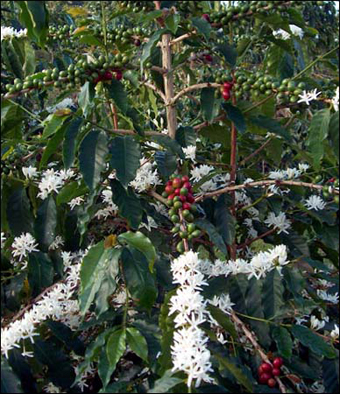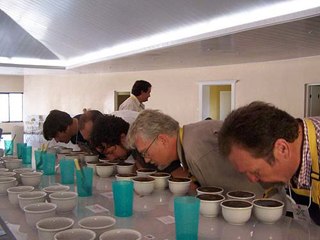Human Flower Project
Saturday, August 04, 2007
Trouble Brewing in the Trees of Brazil
Too-early flowering of the coffee trees in Brazil threatens the java crop of 2008—and jobs.

Brazil’s coffee-scented postage stamp, 2001
(its smell was supposed to last 5 years)
Image: Law Coffee
As we sit up, sip and gain consciousness, we read bad news from Brazil, the biggest coffee-bean producer in the world. “About 20 percent to 30 percent of the coffee trees in the south of Minas Gerais, Brazil’s biggest coffee-producing region, are flowering a month early.” The trees were tricked into bloom by weeks of inordinately heavy rains and now will have to develop buds and beans during one of the driest seasons of the year. Joaquim Goulart, head agronomist at the huge regional coffee cooperative Cooxupe, told Bloomburg, “It could badly hinder the next harvest.’’ Production is expected to drop by about a third.
 Coffee tree with flowers, buds, beans and cherries
Coffee tree with flowers, buds, beans and cherries
Photo: M&M Kona Coffee
We’ve never seen or smelled coffee flowers, but they look quite a bit like jasmine, and some say they smell as sweet and strong. This Panamanian grower compares the fragrance to orange blossoms. Senegal’s poet-president Leopold Senghor alluded to them in a love poem: “Naett, her name has the sugared whiteness of coffee trees in flower….”
A Hawaiian website says it takes seven to nine months for a coffee flower to become a pickable bean. “The flowers form glomerules, or little tufts made up of 8 to 15 elements, at the base of the leaves. They produce the same number of berries, commonly known as cherries because of their colour. The flowers last only a few hours and wilt as soon as fertilisation has taken place: however, others quickly replace them. As a result, it is not uncommon to find leaves, flowers and berries on the tree at the same time! One tree can produce over 30,000 flowers in a year.”
A surprising fact via wiki: coffee growers continually must battle the problem of too many flowers, “as coffee plants tend to produce too many berries; this can lead to an inferior harvest and even damage yield in the following years as the plant will favor the ripening of berries to the detriment of its own health.” So pruning sounds like a non-stop job.
 Coffee buyers in Brazil
Coffee buyers in Brazil
sniff the crust on cups
Photo: Sweet Maria’s
Speaking of jobs, we understand that more than 5 million Brazilians are employed in the coffee trade. How will the early bloom affect them? We don’t know. But we have read that tighening supplies, in Vietnam as well as Brazil, are making coffee investors happy and rich.
“June 21st begins winter in Brazil and the time of year when speculators often buy coffee calls in hopes of a Brazilian freeze driving up coffee prices.” The opposition between the fortunes of producers/workers and the fortunes of investors is pretty bald here. How ‘bout a little Marxism with your coffee?




